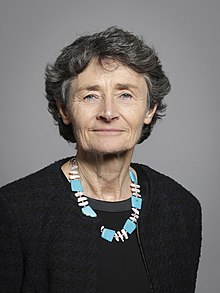The Baroness Morris of Yardley | |
|---|---|
 Official portrait, 2019 | |
| Minister of State for the Arts | |
| In office 13 June 2003 – 5 May 2005 | |
| Prime Minister | Tony Blair |
| Preceded by | The Baroness Blackstone |
| Succeeded by | David Lammy (Culture) |
| Secretary of State for Education and Skills | |
| In office 8 June 2001 – 24 October 2002 | |
| Prime Minister | Tony Blair |
| Preceded by | David Blunkett (Education and Employment) |
| Succeeded by | Charles Clarke |
| Minister of State for School Standards | |
| In office 28 July 1998 – 8 June 2001 | |
| Prime Minister | Tony Blair |
| Preceded by | Stephen Byers |
| Succeeded by | Stephen Timms |
| Parliamentary Under-Secretary of State for School Standards | |
| In office 2 May 1997 – 28 July 1998 | |
| Prime Minister | Tony Blair |
| Preceded by | Cheryl Gillan |
| Succeeded by | George Mudie |
| Member of the House of Lords Lord Temporal | |
| Assumed office 14 June 2005 Life peerage | |
| Member of Parliament for Birmingham Yardley | |
| In office 9 April 1992 – 11 April 2005 | |
| Preceded by | David Bevan |
| Succeeded by | John Hemming |
| Personal details | |
| Born | Estelle Morris 17 June 1952 Manchester, England |
| Political party | Labour |
| Parent | Charles Morris (father) |
| Relatives | Alf Morris (uncle) |
| Alma mater | Coventry College of Education |
Estelle Morris, Baroness Morris of Yardley, PC (born 17 June 1952), is a British politician and life peer who served as Secretary of State for Education and Skills from 2001 to 2002. A member of the Labour Party, she was Member of Parliament (MP) for Birmingham Yardley from 1992 to 2005.
As Education Secretary, she is known for removing compulsory modern languages from secondary schools in England in 2002.[1]
- ^ "Philip Hensher: If only Estelle Morris had learned French". The Independent. 5 December 2006. Retrieved 22 May 2024.
